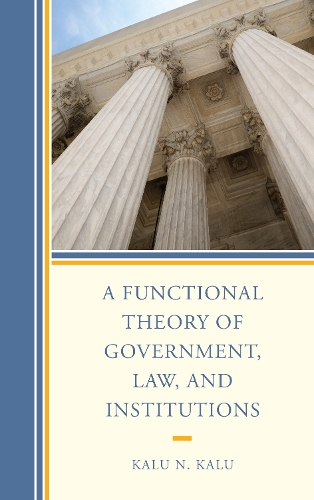
A Functional Theory of Government, Law, and Institutions
(Paperback)
Publishing Details
A Functional Theory of Government, Law, and Institutions
By (Author) Kalu N. Kalu
Bloomsbury Publishing PLC
Lexington Books
15th October 2021
United States
Classifications
Professional and Scholarly
Non Fiction
Comparative politics
Public administration / Public policy
306.2
Physical Properties
Paperback
378
Width 154mm, Height 218mm, Spine 27mm
685g
Description
This book examines the notion that while states may differ in terms of ideology, economic system, and institutional architecture, their role as an organizing framework for system-wide political action and international relations is contingent on a series of competing and oftentimes mutually exclusive factors. This work clarifies factors that contribute to our understanding of the critical roles of systemic and sub-systemic elements of society and how they reinforce the reciprocal problems of human and social organizations, and the institutionalization processes that help to constrain them.
Reviews
This book should have begun on page 54, for it is there that Kalu (political science, Auburn Univ.) lays out his impassioned warning of the dangers awaiting a world that neglects the importance of the state. Kalu asserts, rightly, that state institutions function as guarantors of public safety, providers of public goods, and suppliers of the basic needs of associational ownership (p. 54)all bedrock conditions of sustainable, secure societies. Specifically, institutions of state authority enable economic growth (discussed in chapter 5), individual well-being (chapter 6), justice (chapter 7), and rational governance (chapter 8). Without respect for law and institutions, citizens everywhere stand to lose benefits they hoped they would gain as citizens of the world because states regulate behavior and articulate and defend social values in a way that amorphous global institutions cannot. Kalu summarizes a number of structural-functional theories, but this book applies theory, and does not develop of a new one. What is new is Kalus explanation of the reality beginning to dawn on electorates around the world that the needs of citizens may hang on the efforts vigorous, respected state institutions many may consider antediluvian.
Summing Up: Essential. Upper-division undergraduates through faculty.
Professor Kalu, through his A Functional Theory of Government, Law, and Institutions , has done it again. What a great book! Kalu Kalu, one of the great socio political theorists, whose work covers citizenship to the sociology of functional theory, has produced a best seller. For undergraduates and graduates in the broad range of social sciences A Functional Theory of Government, Law, and Institutions is the must read of 2019. -- Andrew Kakabadse, Henley Business School
"For students of structural-functional analysis, looking for a refresher course, here is an extraordinarily well researched work written in a somewhat conversational style. The very multi-disciplinary nature of the work informs the reader to make sense of the complex phenomenon of the current state of affairs." -- Krishna K. Tummala, professor emeritus (Kansas State)
In a topsy-turvy world, it is often difficult to get our bearings about what should, and alternately does, constitute politico-administrative action, and why Professor Kalus work on functionalism provides an exceptionally well updated view of the big picture that underlies the basic sociological assumptions that are used by almost all social scientists and practicing administratorsno matter whether they are aware of them or not! This treatise on functionalism is exquisitely written and easy-to-understand. The metatheory he provides organizes the bevy of political and administrative theories that populate the modernist and post-modern eras, and while providing a structure that should delight any philosopher, at the same time it provides a wonderful romp through the many challenges we face today. -- Montgomery Van Wart, National University of Ireland
Author Bio
Kalu N. Kalu is Distinguished Research Professor of Political Science and National Security Policy at Auburn University, Montgomery.
